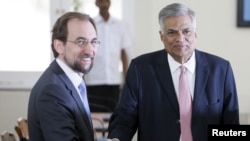A committee appointed by Sri Lanka's government has recommended that both local and international judges be appointed to the court that will investigate allegations of war crimes from the country's civil war.
The U.N. high commissioner for human rights called for a hybrid court in 2015. Sri Lanka agreed to the participation of foreign judges, then backtracked. It now insists that local courts investigate the allegations.
The civil war ended in 2009 when Sri Lanka's military crushed the Tamil Tiger rebels who had fought for an independent state for ethnic minority Tamils in the country's north and east. Both sides were accused of war crimes, particularly in the final months of fighting.
The recommendation for a hybrid court was made in a report released this week by the Consultation Task Force on Reconciliation Mechanisms, which sought public views on the proposed mechanism for transitional justice and reconciliation.
The court should have "a majority of national judges as well as a sufficient number of international judges" to ensure at least one foreign judge per bench in case of absences, the task force's report said.
It also said foreigners should be part of the office of the Special Counsel of prosecutors and investigators and contribute technical assistance.
Phasing out foreigners
"International participation should be phased out once trust and confidence in domestic mechanism are established and when the required expertise and capacity has been built up, nationally," the executive summary of the report said.
Task force member Gamini Viyangoda said the members were not aware of the government's next step on the recommendations. "But, we believe this report will pressure the government to take some positive steps, because this report contains the views of the people of this country," he told reporters Thursday.
Sri Lanka has faced criticism for failing to properly investigate alleged human rights abuses amounting to war crimes during the final phase of the civil war.
According to U.N. estimates, up to 100,000 people were killed in the 26-year war, but many more are feared dead, including up to 40,000 civilians in the final months of the fighting.




